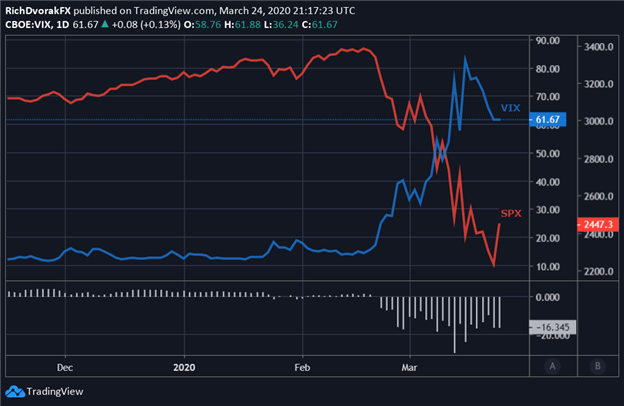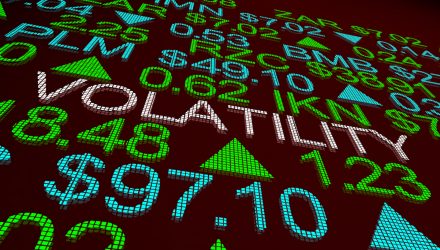The CBOE Volatility Index or VIX has come off some of its highest levels in history recently, as stocks rally back after a stimulus package was approved by the Senate earlier Wednesday morning.
For investors hoping that the worst of the volatility has passed, then Wednesday’s follow in the S&P 500, Dow Jones Industrial Average, and Nasdaq, as well as in global equities leaves more room for encouragement than yesterday’s throttle higher.
Typically, volatility tends to calm down during periods of gradual rallying, as opposed to a short-lived rocket higher similar to what has happened to the market over the last couple of days. Thus, the best bet for investors looking for a sustained dropped in VIX is for the market to grind higher in the coming days.
The VIX reached closed at its highest level in history last week when U.S. shares finished with their steepest drop since the Black Monday stock-market crash of 1987. At that point, some investors were already betting on its rapid fall.
The CBOE Volatility Index, which analyzes the options markets to determine how much volatility market participants anticipate will occur in the near future, reached more than 85. The index exploded nearly 25 points, surpassing the peak level of 80.74 on Nov. 21, 2008. The VIX has climbed to lofty heights as markets have sold off in a precipitous drop, entering into bear market territory as the coronavirus contagion continues to cause worldwide economic destruction. But in the last week, the index has declined more than 38%, falling from 85 to just above 52, and then has begun trading between 60-70 over the last couple of days.
The chart below shows the relationship between the VIX and the S&P 500 and how a drop in stocks generally correlates with a rally in the VIX and vice-versa.

Chart created by @RichDvorakFX with TradingView
Those investors who purchased VIX ETFs have made a killing over the last month or so, but now may be the time to consider switching gears, as volatility simmers.
This means that investors in VIX ETFs like the iPath Series B S&P 500 VIX Short Term Futures ETN (NYSEArca: VXX) which increased 300% YTD, ProShares VIX Short-Term Futures ETF (NYSEArca: VIXY), up 227% YTD, and the VelocityShares Daily Long VIX Short-Term ETN (NYSEArca: VIIX) which advanced 227%, while the CBOE Volatility Index rocketed higher, might do well to revisit portfolios while stocks rally back a bit. Potential investors should also keep in mind that VIX-related exchange traded products track VIX futures and not the spot price.
For more market trends, visit ETF Trends.








